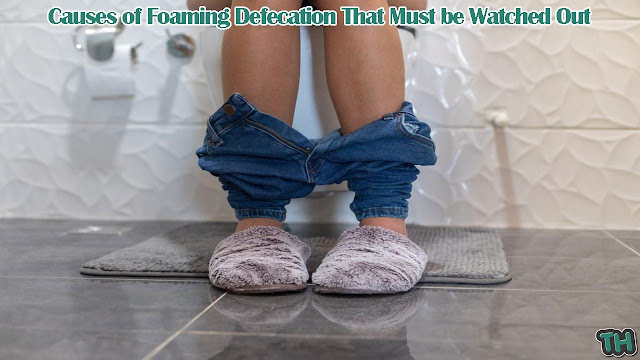Foaming defecation is usually closely related to the food consumed or treatment that is being undertaken. However, the emergence of foam in stools can also be a sign of health problems that need to get immediate medical treatment.
Changes in size, shape, color, and texture can be important clues to identify various diseases. One change that occurs in feces is when defecation seems foamy.
Foaming defecation occurs when there are too much fat content and mucus on feces. Fluid mucus can look like foam or be found in foaming feces. Mucus on feces is generally normal and serves to help launch the exit of feces and protect the intestine. However, too much mucus in feces can be a sign of change in the digestive system, which leads to certain diseases.
Clinical conditions causes of foaming
In medical terms, too many fats on stools are called Steatorrhea. This condition can be a sign of malabsorption of fat, which is not digested and not well absorbed. Steatorrhea is generally marked with oily feces, feces look pale or like mud, stools smell foul and soft.
In addition to malabsorption of fat, defecating foaming or steatorrhea is also part of the symptoms of several clinical conditions, such as pancreatitis, cystic fibrosis, and abscesses or fistulas in the anus section. Foaming defecation needs to be watched out for if accompanied by symptoms in the form of bloody defecation, abdominal pain, fever, vomiting nausea, and diarrhea.
Disruption to the digestive system
Defecate of foaming or too much mucus on feces can be a sign of disruption to the digestive system, such as:
Food poisoning
In addition to symptoms similar to flu symptoms, food poisoning can cause stools to be slimy.
Bacterial infection
Clostridium difficile bacteria can cause severe diarrhea accompanied by slimy feces and foul-smelling. Other bacterial infections, for example in dysentery, can also cause slimy stools.
Giardiasis
Giardiasis is a Giardia Lamblia parasite infection that causes inflammation in the digestive tract. This infection is obtained from water and contaminated food, or swimming activity. Parasites can be transmitted between people, especially if exposed to infected stools. Symptoms include diarrhea, flatulence, defecating foaming or foaming stools, nausea and abdominal pain, and fever. The treatment is by administering antibiotics from doctors, and maintaining the need for body fluids so they do not experience dehydration.
Intestinal inflammatory disease (Inflammatory Bowel Disease / IBD)
Intestinal inflammation, such as Crohn's disease and ulcerative colitis are conditions that can cause intersections. In addition to diarrhea and abdominal pain, this condition allows foaming feces, naturally, even bloody.
Proctitis
proctitis is inflammation at the bottom of the large intestine or rectum. Inflammation of intestines and sexually transmitted diseases can be the cause.
Celiac disease
Celiac disease is a condition due to the problem of the immune system that reacts when consuming foods that contain gluten and damage the cells of the small intestine walls. This condition also causes fat malabsorption and triggers foaming defecation.
Despite foaming, defecation can usually disappear by itself in a few days or a few weeks, but you still need to be aware of the possibility of other causes of foaming. Don't hesitate to see your doctor, especially if foamy defecation is accompanied by bloody stools, diarrhea for more than two days (or more than one day in children), fever, and severe abdominal pain.


Post a Comment for "Causes of Foaming Defecation That Must be Watched Out"